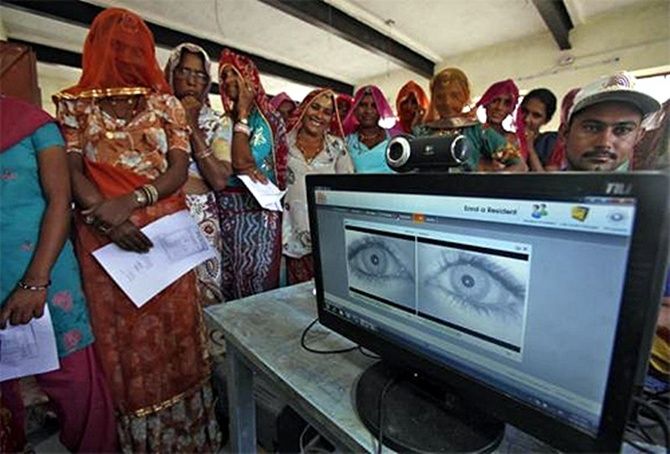'The striking down of the use of Aadhaar by private companies implicitly calls for the deletion or erasure of all personal data vested in the servers of the private service providers.'

On Wednesday, September 26, 2018, the Supreme Court upheld the Constitutional validity of Aadhaar but struck down parts of the Aadhaar Act.
"The judgment is explicit: The collection of information is in silos and merging it to deploy the instruments of mass surveillance is prohibited. The caveat to remember is that there is no metric to predict political behaviour. The citizen therefore has to be eternally vigilant," Shankkar Aiyar, political economy analyst and author of Aadhaar: A Biometric History of India's 12-Digit Revolution, and visiting senior fellow of IDFC Institute, tells Rediff.com's Utkarsh Mishra.
How far is the verdict in the government's favour as it upholds the necessity of Aadhaar for filing income tax returns and availing of subsidies?
It is an excellent judgment that balances individual rights and national interests.
Many of the critical issues were flagged in the epilogue of my book.
These ranged from the provisions in Section 47 that denied individuals the right to redressal, the use of the omnibus preamble to expand linkage of Aadhaar, the deployment of Aadhaar for every ill of governance.
It has reviewed the Aadhaar Act and read down or struck down provisions, making it citizen friendly.
The judgment has weighed in in favour of rooting out corruption in delivery of welfare and curbing the accumulation and use of black money and therefore has upheld the necessity of Aadhaar for filing returns in tune with its order on the issue earlier.
By keeping Aadhaar mandatory for any of the services, does the verdict contravene the Right to Privacy judgment in any way?
The conflict between individual interest and public interest has been balanced.
All rights are corralled by conditions. The issue of privacy of personal information will be enforced through the law on data protection and privacy.
The Court ruled that private companies cannot insist on Aadhaar details, so what effect would it have on people's personal data already available with these entities? How will it affect the functioning of e-wallets?
The striking down of the use of Aadhaar by private companies implicitly calls for the deletion or erasure of all personal data vested in the servers of the private service providers.
The details of how and when needs clarity, which will follow as UIDAI, government and private companies seek clarifications.
Does the verdict address the concerns of the petitioners that Aadhaar can be used for mass surveillance?

The judgment is explicit that the collection of information in silos and merging it to deploy the instruments of mass surveillance is prohibited.
It states, 'The information collected, as aforesaid, remains in silos. Merging of silos is prohibited.'
This is as of now. The caveat to remember is that there is no metric to predict political behaviour.
The citizen therefore has to be eternally vigilant.
If one sets aside the fear of identity theft -- of which, as you mentioned in your book, there has been no case reported in India so far -- how much should a person worry if his/her Aadhaar number is leaked?
The revealing of the number is prohibited and punishable under the existing law.
The judgment has also placed the onus of ensuring this on the government.
The judgment says, 'We are of the view that there is a need for a proper legislative mechanism for data protection'.
That said, there are areas of disappointment.
The power of the UIDAI to cancel Aadhaar leaves the citizen vulnerable and a more explicit view is needed.
Also, there is need for clarity on the argument that no person shall be denied entitlement for lack of Aadhaar.
While the majority verdict supports the categorisation of the Aadhaar Act as a money bill, Justice D Y Chandrachud called it 'a fraud on the Constitution'. Which view do you support?
The majority view has upheld the passage of the Aadhaar Act 2016 as a 'money bill'.
The point made by Justice Chandrachud on this issue merits attention -- particularly the fact that the burden of decision is on an individual when ideally it should be on the institution of Parliament.
The larger question here is how well is a legislation scrutinised by elected representatives. And the emerging trend of bypassing select and standing committee scrutiny is worrisome.
There is also the reality of bills dealing with use of public monies in lakhs of crores being passed by Parliament in minutes.
This is not in the spirit of the basis and afflicts the quality of legislation.
The very fact that four important sections of the Aadhaar Act have been reviewed/stripped/struck down is a testimony on the need for better scrutiny.
By upholding the Aadhaar-PAN linkage, does the verdict pave way for the linking of Aadhaar to other ids, like driving licences, if the government wants to do so?
Prima facie, any attempt to expand the use of Aadhaar will result in litigation and judicial review.
Will the government legislate its way through is the question and this again will depend on the role of elected representatives.
The resistance to the passage of changes in the Motor Vehicles Act despite the number of accidents reflects one end of the spectrum of political thought.
In your book, you discussed the need for data protection laws. Do you find the recommendations of Justice B N Srikrishna panel satisfactory in that direction?
The draft law proposed by the Justice Srikrishna Committee is an excellent template to work from.
The protection of data is not about collection. but what it is used for by who and where.
There is room for improvement in the leeway granted to the State by the draft bill and call for a review.











 © 2025
© 2025